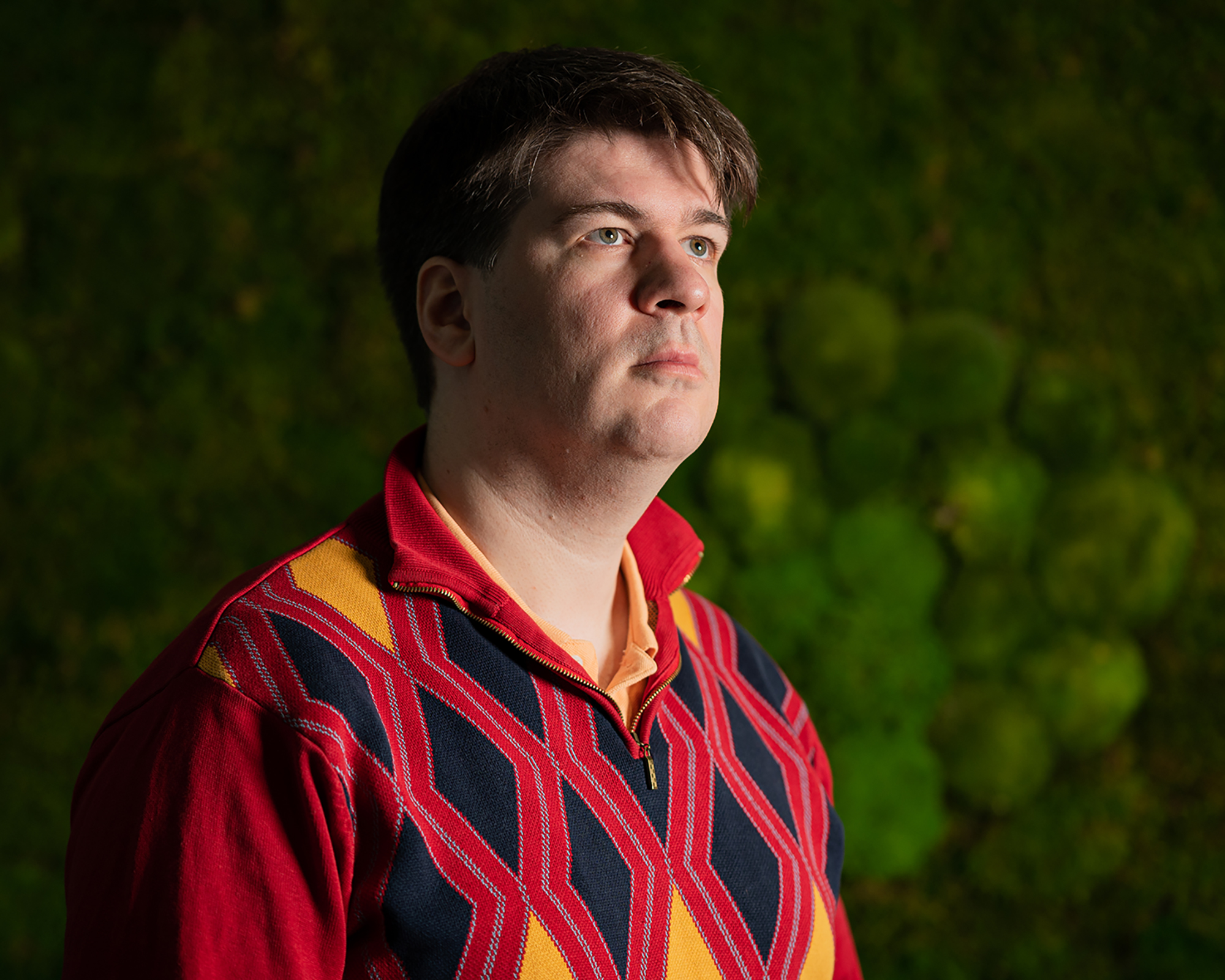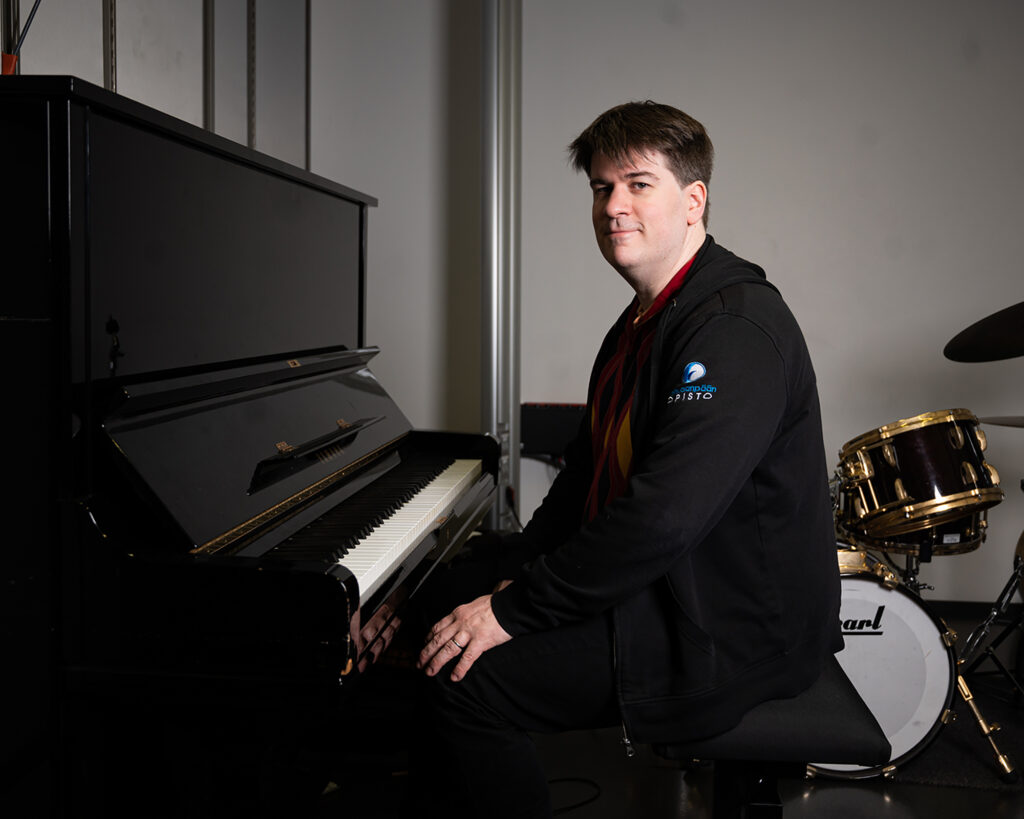Can a newcomer become a representative of Finnish culture? “You are seen as something confusing”

“Music in Finland is a brand. They want to keep the brand out of complications like myself,” says Matei Gheorghiu.
Oksana Chelysheva
Sercan Alkan
Published 28.01.2025 at 6:02
Updated 06.02.2025 at 3:22
In November 2024, Matei Gheorghiu won the international Uuno Klami composition competition. His piano concerto, From the Village of Nowhere, was favourite of both the jury and the audience in a competition that was noted to be “exceptionally high standard”.
The way the victory was treated in the Finnish media, however, surprised the Romanian-Finnish composer. He remembers listening experts discussing the competition in Yle’s morning programme. He felt that the discussion was all about his identity and the question of him being either Finnish or Romanian.
“They debated whether I’m Finnish or Romanian living in Finland, or even if it matters as long as I make good music,” he says now in Helsinki central library Oodi, more than two months after the victory. He does not hide his bewilderment. “What struck me is that all three had different views on it, but it seemed that no one checked if I actually had citizenship.”
“Why on Earth the program was more about my identity rather than the music itself?”
For Gheorghiu, the question of identity is clear. He prefers the term Romanian-Finnish. But since he became a Finnish citizen already in 2019, in the competition he represented Finland.
As he wrote on Facebook: “If I am considered a Finnish composer, I am the first Finnish winner of the Uuno Klami competition.”
But as the discussion after the competition pointed out, for Finns it seems not to be a straightforward question. Can someone become a Finnish composer without being born in Finland?
From playing a paper piano to creating a career in music
Matei Gheorghiu has spent almost half of his life in Finland. He arrived in 2007 to study at the Sibelius Academy. With his background, it was a step against the odds.
Born in Bucharest in 1984, Gheorghiu grew up in Romania controlled by the oppressive regime of Nicolae Ceaușescu. The country was poor, even blackouts and food shortages were everyday reality.
Gheorghiu’s parents were not musicians but listened to a lot of classical music at home. As a child, Gheorghiu dreamt of playing the organ.
“But there was no chance of getting near to a one,” he says. He needed to settle for a piano. And at first, not even a real one. His first instrument was a set of keys drawn on paper.
However, Gheorghiu’s parents were willing to make sacrifices to give their children opportunities they themselves never had.
They sold their wedding rings to get the money to buy Gheorghiu his first piano and enrolled him to a music school. There he excelled in subjects like harmony and theory of music. A teacher assured that Gheorghiu could be trained as a composer.
His parents started to pay for private lessons.
For that, even harder work was needed. Gheorghiu’s father, who had worked as a tourist guide when his son was young, studied law after the 1989 revolution, and later even took a dangerous job in Iraq to fund his children’s education. That is what eventually made the studies abroad possible.
Pivot to integration
In 2007 Gheorghiu graduated as a bachelor from the National Music University of Bucharest. Thanks to his father’s job, he could start planning further studies abroad. Sibelius academy attracted him first for “being one of the best schools where I could learn in English”.
He, of course, was familiar with Jean Sibelius but had also listened to music by Finns such as Magnus Lindberg, Jonas Kokkonen and Kalevi Aho.
For him the fact that “such a small country could give birth to big composers meant that there must be something good in the environment.”
He recollects his entrance exams to the Sibelius Academy as being extremely stressful.
“It was scary. I came to a different country all alone. It was the first time when I was on the plane.”
However, he was able to pass the exam and started studies at the Master’s program at the Sibelius Academy.
Life in Finland was not always easy. At first, financial support from his father made it possible for Georghiu to concentrate on his studies, despite not having access to Finnish student benefits.
After a few years though, Gheorghiu’s father had to leave his well-paying job. After that Gheorghiu had to work odd jobs to make his living. He worked as a piano teacher, cleaner, mover and a dishwasher.
“At first, these jobs felt fun, but they eventually drained me,” he admits. He also felt embarrassed to even tell his workmates that he had a degree of music from the Sibelius Academy.
There were moments, when Gheorghiu felt that Finland was not for him. He struggled with the language and felt like an outsider.
“I felt Finland did not want me.”
A friend’s advice helped him to shift his perspective. “Nobody can live in a country they do not love,” the friend said. That led Gheorghiu to focus on integrating to Finnish society. He had started to learn Finnish already as a student.
“Back then I was not sure where I am after graduation. I just felt like wanting it,” he says.

Learning the language, securing a job within his own field and befriending Finns were important. But the true road to integration was music. He mentions Tapio Tuomela, his composition teacher at Sibelius Academy, who “taught me a lot of things in composition that I didn’t learn in Romania”.
Another important connection was an association called Korvat Auki (Ears open society). It is a society of young Finnish composers, which Gheorghiu joined and even became a chair. When Korvat Auki celebrated their 35th anniversary in 2012, Gheorghiu was the artistic director of the celebratory concert.
Integration through music was possible, because Gheorghiu found people, who respected the music he created. They valued it and were eager to play it – something Gheorghiu says he did not experience in Bucharest.
“People here do really care about my music, and it can actually sound good.”
Becoming a Finn
When asked to describe his identity, Gheorghiu starts with a connection to his roots.
“I am Romanian. I will always be Romanian,” he says. But during the years, his identity has gotten a Finnish side as well.
“I did not fell in love with Finland instantly. But when I did, I wanted it to love me back.”
Today, Gheorghiu feels a profound connection to Finland.
“When I watch a football match, I sincerely want the Finnish team to win,” he says. “I’m happy when things go well for Finland and appreciate its culture, people, and often-overlooked aspects.”
He mentions especially punctuality and the culture of following the rules.
“If someone says the deadline is at four, it is at four. There’s is not someone trying to go around the rules all the time, as my country still functions.”
Receiving Finnish citizenship in 2019 was a deeply meaningful moment.
“It was one of the happiest days ever,” he says laughing. “For a month, I woke up every morning thinking, ‘Holy shit, I’m a Finn!’”
But how well the Finns have accepted the newcomer? Unlike some others, Gheorghiu doesn’t think Finland is a racist country. But neither are the Finns totally willing to welcome someone from the outside to represent the Finnish culture. Gheorghiu feels that Finns don’t know how to market immigrant composers, so it might be an explanation as to why they aren’t much put forward as worthy representatives of the Finnish culture.
Gheorghiu circles back to his own experiences after winning the Uuno Klami competition.
“You’re seen as something confusing – a complication. Are you Finnish if you’re not Finnish?” he says. “They don’t know how to treat you.”
The article was edited on February 6, 2025 at 14:22. Added more context about Gheorghiu’s reaction about the YLE morning programme after his victory.